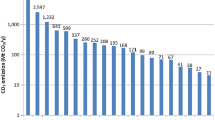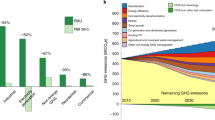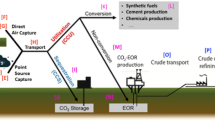Abstract
Purpose of Review
To describe the role of health equity in the context of carbon capture, utilization, and sequestration (CCUS) technologies.
Recent Findings
CCUS technologies have the potential to both improve and worsen health equity. They could help reduce greenhouse gas emissions, a major contributor to climate change, but they could also have negative health impacts like air and noise pollution. More research is needed to fully understand the health equity implications of CCUS technologies.
Summary
CCUS technologies have both health equity risks and benefits. Implementing misguided CCUS projects in vulnerable communities could exacerbate environmental injustice and health disparities and have the potential to increase carbon emissions. However, well-conceived projects could benefit communities through economic development. Governments, industry, and society should prioritize and expedite the reduction of CO2 emissions before considering carbon reductions via CCUS. Furthermore, CCUS projects must be thoroughly evaluated and should only proceed if they have demonstrated a net reduction in CO2 emissions and provide more benefits than risks to local communities. This underscores the importance of prioritizing health equity in the planning of CCUS projects.



Similar content being viewed by others
Data Availability
No datasets were generated or analyzed during the current study.
Code availability
Not applicable.
References
Romanello M, et al. The 2021 report of the Lancet Countdown on health and climate change: code red for a healthy future. Lancet. 2021;398(10311):1619–62.
Jacobson M. "The health and climate impacts of carbon capture and direct air capture. Energy and Environmental Sciences. 2019;12:3567–74.
IEA, “Carbon capture, utilisation and storage - energy system.” [Online]. Available: https://www.iea.org/energy-system/carbon-capture-utilisation-and-storage. [Accessed: 19-Sep-2023].
Naims H. Economics of carbon dioxide capture and utilization—a supply and demand perspective. Environ Sci Pollut Res. 2016;23(22):22226–41.
UN, “Carbon capture utilization & storage - technology essential for an equitable energy path forward.” [Online]. Available: https://media.un.org/en/asset/k1w/k1w7wz6hqu. [Accessed: 19-Sep-2023].
IPCC, “AR6 Climate Change 2022: mitigation of climate change.” [Online]. Available: https://www.ipcc.ch/report/sixth-assessment-report-working-group-3/. [Accessed: 19-Sep-2023].
ESCWA, “Carbon capture utilization and storage challenges and opportunities for the Arab region,” 2017.
UNEP - UN Environment Programme, “Carbon dioxide capture and storage.” [Online]. Available: https://www.unep.org/resources/report/carbon-dioxide-capture-and-storage. [Accessed: 19-Sep-2023].
Mac Dowell N, Fennell PS, Shah N, Maitland GC. The role of CO2 capture and utilization in mitigating climate change. Nat Clim Chang. 2017;7(4):243–9.
Public Health Institute at Denver Health, “Health equity.” [Online]. Available: https://www.phidenverhealth.org/about-us/health-equity. [Accessed: 19-Mar-2023].
Bailey J, Gerasopoulos E, Rojas-Rueda D, Benmarhnia T. Potential health and equity co-benefits related to the mitigation policies reducing air pollution from residential wood burning in Athens, Greece. J Environ Sci Health A Tox Hazard Subst Environ Eng. 2019;54(11):1144–51.
Watts N, et al. The 2019 report of The Lancet Countdown on health and climate change: ensuring that the health of a child born today is not defined by a changing climate. The Lancet. 2019;394(10211):1836–78 (Lancet Publishing Group).
Olfe-Kräutlein B. Advancing CCU Technologies pursuant to the SDGs: a challenge for policy making. Front Energy Res. 2020;8: 559846.
McLaughlin H, et al. Carbon capture utilization and storage in review: sociotechnical implications for a carbon reliant world. Renew Sustain Energy Rev. 2023;177: 113215.
Liu E, Lu X, Wang D, Liu E, Lu X, Wang D. A systematic review of carbon capture, utilization and storage: status, progress and challenges. Energies. 2023;2023(16):2865.
Hepburn C, et al. The technological and economic prospects for CO2 utilization and removal. Nature. 2019;575(7781):87–97.
Susanti I. Technologies and materials for carbon dioxide capture. Sci Educ Appl J. 2019;1(2):84.
Hanifa M, Agarwal R, Sharma U, Thapliyal PC, Singh LP. A review on CO2 capture and sequestration in the construction industry: Emerging approaches and commercialised technologies, J CO2 Util. 2023;67:102292. https://doi.org/10.1016/j.jcou.2022.102292, https://www.sciencedirect.com/science/article/pii/S2212982022004115.
Robertson B, Mousavian M. The carbon capture crux: lessons learned. Institute for Energy Economics and Financial Analysis (IEEFA), 2022. https://ieefa.org/sites/default/files/2022-09/The%20Carbon%20Capture%20Crux.pdf.
UN, “UN report calls for scaling-up carbon capture, use and storage.” [Online]. Available: https://news.un.org/en/story/2021/03/1086312. [Accessed: 19-Sep-2023].
Gabrielli P, Gazzani M, Mazzotti M. The role of carbon capture and utilization, carbon capture and storage, and biomass to enable a net-zero-CO2 emissions chemical industry. Ind Eng Chem Res. 2020;59(15):7033–45.
Jacobson M. Should transportation be transitioned to ethanol with carbon capture and pipelines or electricity? A case study. Environ Sci Technol. 2023;57(44):16843–50.
Blomen E, Hendriks C, Neele F. Capture technologies: improvements and promising developments. Energy Procedia. 2009;1(1):1505–12.
Zapata MA, Bates LK. Equity planning revisited. J Plan Educ Res. 2015;35(3):245–8.
Braveman P. What are health disparities and health equity? we need to be clear. Public Health Rep. 2014;129(SUPPL. 2):5–8.
Rojas-Rueda D, et al. Environmental risk factors and health: an umbrella review of meta-analyses. Int J Environ Res Public Health. 2021;18(2):704.
Pierangeli I, Nieuwenhuijsen MJ, Cirach M, Rojas-Rueda D. Health equity and burden of childhood asthma - related to air pollution in Barcelona. Environ Res. 2020;186:109067.https://doi.org/10.1016/j.envres.2019.109067, https://www.sciencedirect.com/science/article/pii/S0013935120300177.
Rojas-Rueda D, Morales-Zamora E. Built environment, transport, and COVID-19: a review. Curr Environ Heal Rep. 2021;8(2):138–45.
Jones R, Macmillan A, Reid P. Climate change mitigation policies and co-impacts on indigenous health: a scoping review. Int J Environ Res Public Health. 2020;17(23):9063. https://doi.org/10.3390/ijerph17239063.
Mindell JS, Boltong A, Forde I. “A review of health impact assessment frameworks. Public Health. 2008;122(11):1177–87.
Fitzgerald J. Transitioning from urban climate action to climate equity. J Am Plan Assoc. 2022;88(4):508–23.
Thielges S, Olfe-Kräutlein B, Rees A, Jahn J, Sick V, Quitzow R. Committed to implementing CCU? A comparison of the policy mix in the US and the EU. Front Clim. 2022:4. https://doi.org/10.3389/fclim.2022.943387, https://www.frontiersin.org/articles/10.3389/fclim.2022.943387.
Clark MA, Springmann M, Hill J, Tilman D. Multiple health and environmental impacts of foods. Proc Natl Acad Sci U S A. 2019;116(46):23357–62.
Zinsstag J, Crump L, Schelling E, et al. Climate change and one health. FEMS Microbiol Lett. 2018;365(11):fny085. https://doi.org/10.1093/femsle/fny085.
Sinclair JR. Importance of a One Health approach in advancing global health security and the Sustainable Development Goals. Rev Sci Tech. 2019;38(1):145–54. https://doi.org/10.20506/rst.38.1.2949.
Barton Behravesh C. Introduction. One Health over a decade of progress on the road to sustainability. Rev Sci Tech. 2019;38(1):21–50. https://doi.org/10.20506/rst.38.1.2939.
Gepp S, Jung L, Wabnitz K, et al. The Planetary Health Academy-a virtual lecture series for transformative education in Germany. Lancet Planet Health. 2023;7(1):e68–76. https://doi.org/10.1016/S2542-5196(22)00253-4.
Eyitayo SI, Okere CJ, Hussain A, Gamadi T, Watson MC. Synergistic sustainability: future potential of integrating produced water and CO2 for enhanced carbon capture, utilization, and storage (CCUS). J Environ Manage 2023 https://doi.org/10.1016/j.jenvman.2023.119713
Potter TM. Planetary Health: an essential framework for nursing education and practice. Creat Nurs. 2021;27(4):226–30. https://doi.org/10.1891/cn-2021-0017.
Wabnitz K, Galle S, Hegge L, Masztalerz O, Schwienhorst-Stich EM, Eichinger M. Planetare Gesundheit – transformative Lehr- und Lernformate zur Klima- und Nachhaltigkeitskrise für Gesundheitsberufe [Planetary health-transformative education regarding the climate and sustainability crises for health professionals]. Bundesgesundheitsblatt Gesundheitsforschung Gesundheitsschutz. 2021;64(3):378–83. https://doi.org/10.1007/s00103-021-03289-x.
Cherepovitsyn A, Chvileva T, Fedoseev S. Popularization of carbon capture and storage technology in society: principles and methods. Int J Environ Res Public Health. 2020;17(22):8368. https://doi.org/10.3390/ijerph17228368.
Acknowledgements
The editors would like to thank Mark Z. Jacobson for handling the review of this manuscript.
Author information
Authors and Affiliations
Contributions
David Rojas-Rueda: conceptualization, data curation, formal analysis, investigation, methodology, visualization, writing—original draft. Kelly McAuliffe: investigation, visualization, writing—review and editing. Emily Morales-Zamora: formal analysis, writing—review and editing.
Corresponding author
Ethics declarations
Ethics Approval
Not applicable.
Consent to Participate
Not applicable.
Consent for Publication
Not applicable.
Conflict of Interest
The authors declare no competing interests.
Human and Animal Rights and Informed Consent
This article does not contain any studies with human or animal subjects performed by any of the authors.
Additional information
Publisher's Note
Springer Nature remains neutral with regard to jurisdictional claims in published maps and institutional affiliations.
Rights and permissions
Springer Nature or its licensor (e.g. a society or other partner) holds exclusive rights to this article under a publishing agreement with the author(s) or other rightsholder(s); author self-archiving of the accepted manuscript version of this article is solely governed by the terms of such publishing agreement and applicable law.
About this article
Cite this article
Rojas-Rueda, D., McAuliffe, K. & Morales-Zamora, E. Addressing Health Equity in the Context of Carbon Capture, Utilization, and Sequestration Technologies. Curr Envir Health Rpt (2024). https://doi.org/10.1007/s40572-024-00447-6
Accepted:
Published:
DOI: https://doi.org/10.1007/s40572-024-00447-6




